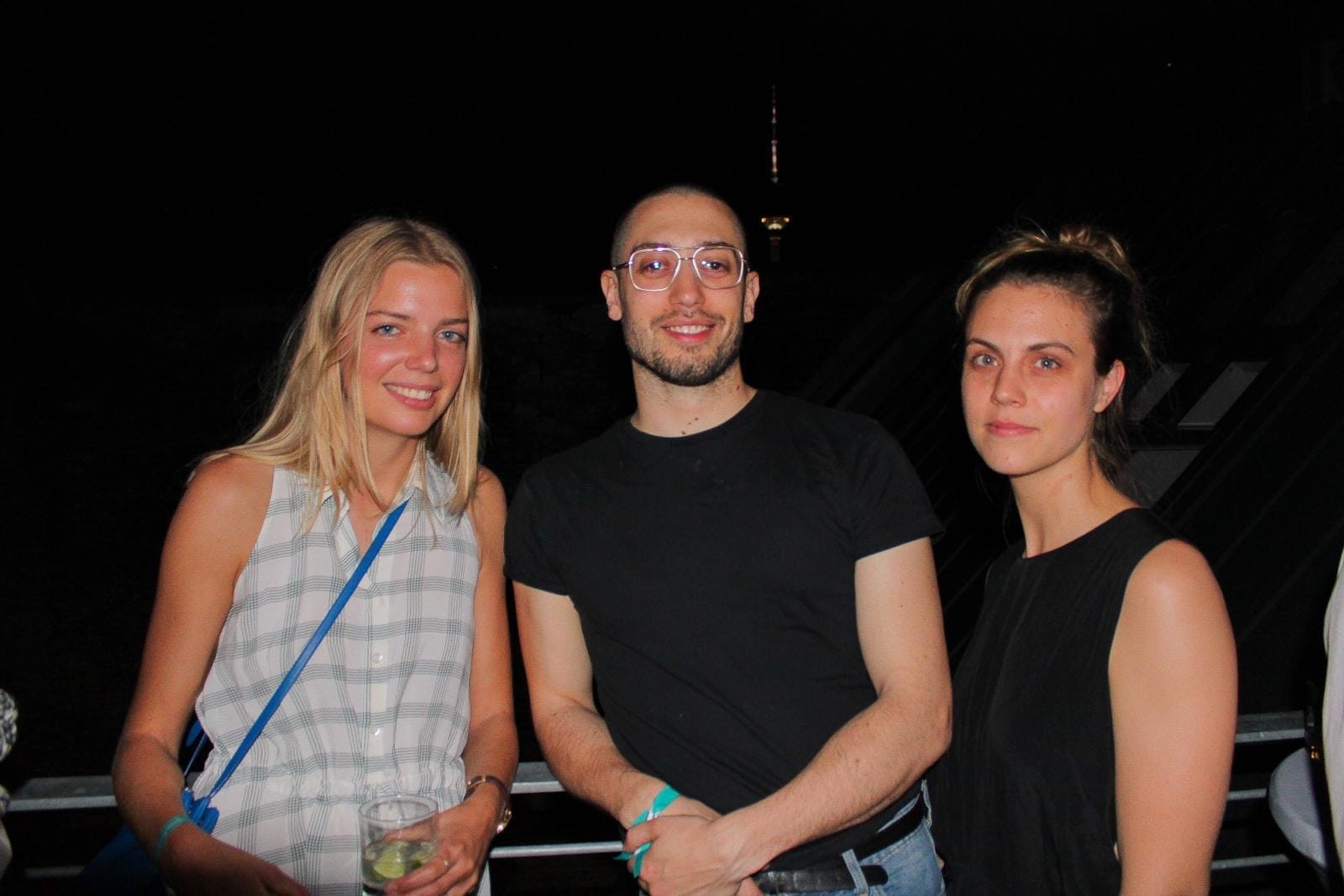Charlotte's Story: From a Serendipitous Childhood Ski Trip to Co-Founding Flank
A chance meeting on a ski trip sparked a lifelong friendship and a revolutionary AI venture. Dive into Charlotte Kufus' story and what led to Flank’s cutting-edge success.

Charlotte Kufus is Managing Director and one of the original co-founders of Flank. I love an origin story, so I called her up to ask her about her journey so far. After some housekeeping on our recording platform, we dive straight into it.
Lorna Khemraz: Could you tell us about some of the key influences you had growing up?
Charlotte Kufus: Yeah, I’d be happy to. I’m Charlotte, I was born and raised in beautiful Berlin, with two brothers. I have an older and a younger brother, so I’m the 'sandwich child', as we say in Germany, the one that always gets neglected (laughs). Fortunately, I was the only girl.
I really enjoyed the city growing up when I was a teenager, there was a really cool party scene and a lot of great clubs.
After finishing school, I decided to study psychology, because I was always interested in group dynamics, how people interact with and influence each other. Social psychology, especially, really interested me. In Germany it’s not super straightforward to get into university for specific classes, so I had to move to Würzburg, which is a small town in Southern Germany. It’s a great university, but for me it was a big change to move from the capital to a city in Bavaria, which is known to be very traditional and conservative. But they had a lot of vineyards, so this is actually where I started to drink wine (laughs).

LK: Social psychology is really interesting, for sure. Tell me, how do you know Lili and Jake? Where do they fit into the picture?
Lili and I met when we were seven years old, on a skiing trip. Our parents went on the skiing trip with mutual friends of theirs. They didn’t know each other, but they thought it was a great idea, because they both had daughters the same age. So Lili and I were basically set up.
CK: Lili and I met when we were seven years old, on a skiing trip. Our parents went on the skiing trip with mutual friends of theirs. They didn’t know each other, but they thought it was a great idea, because they both had daughters the same age. So Lili and I were basically set up. Ever since, we’ve built a really great friendship. We didn’t go to the same school, but at least once a year we spent one or two weeks in the South of France, where her family has a house. These holidays were always great.

I know Jake through Lili, because they met at university in the US. I did my master’s degree at the London School of Economics, and we all connected when they both moved to London. I actually planned and started to do my PhD. I did research in the field of collective intelligence and decentralized networks, and I was excited about that, doing a lot of interesting experimental research. But when Lili moved to London, we started chatting about our future. She asked me - do you really want to spend four more years at a library? Why don’t we start a company together. And I was like, actually that sounds like a good idea. This is how it all started, and so we moved back to Berlin to start Flank.
LK: So, you’ve known each other for all these years. I’m curious as to what kind of conversations you were having as kids. Was it always on the radar to start something together at some point, or was this a completely unexpected development?
CK: Lili’s parents are both entrepreneurs, mine are both designers, so we come from very different backgrounds. In the many conversations we had, we talked about how it would be great to do something together because we trust each other. I was certainly always very inspired by her. I thought about who else I could imagine starting a company with, and not many people came to mind.
LK: This is certainly a huge step to take with someone. What was your thought process like? You decided to quit your PhD and go down the founder route, which we all know is incredibly tough. What decision factors were you weighing up at the time? What are your reflections and observations now when you look back on that journey?
CK: First of all, I was very interested in systems change. When Lili pitched the idea of doing something in the legal sector, I thought it was great. Law is such an important area of life, but it’s not accessible. Why is it not accessible? Mainly because it’s not digitized, and it’s one of the few industries that hadn’t been digitized at all, even though it’s actually in a great position to get digitized, because everything is text-based and rule-based. This is what interested me.
Then I think, on a more personal level, I really like to be challenged. I really thrive when I need to solve problems and do a lot of things at the same time. And building a company involves so many things on different levels, of course a lot of strategic work, but then also these little annoying things, these problems you need to solve on an everyday basis, and it never gets boring. That intrigued me.
And then I have to say, I was very naive. I’d just finished my master’s degree and I didn’t really know what to expect. It’s crazy, but I think you need to be a little bit naive, otherwise you wouldn’t start a company because it’s very stressful, but so rewarding at the same time.

LK: I get that… Usually when people start companies, there’s an idea at the beginning, then very often that idea evolves. Can you tell me a little bit about what the initial plan was and what the evolution has been to what Flank is today?
CK: It all started with how Lili grew up, because she grew up in a family of lawyers, and her dad is a professor of law. But he was always different. He had this law professor part to him, but he also had this entrepreneur and visionary part. What he did was he developed a methodology for visualizing legal processes. The initial idea was to help his students learn smarter, because studying law, especially in Germany, is tough. You have to just learn facts and stuff by heart, it’s not so much about the methodology. And I think he always hated that, because law is such a rule-based system. So, he thought, why don’t we train our students to think in a specific way, so they can solve any problem. Next time they need to train in a new area of the legal system, they can just apply the methodology.
When you visualize rules, the next step is automation. Rules are the basis for automation. The initial idea was to build a tool for law firms to automate complex documents, like drafting contracts. How lawyers usually create a contract is very manual and repetitive, it’s based on Word, and it just doesn’t make sense. So we thought that’s actually a great problem to solve. We started building a no-code tool for law firms, and we acquired a couple of really interesting customers. We worked with a lot of boutique law firms in the field of VC law. They automated financing contracts with our tool, for example seed financing round contracts, where when you change one term in the contract, it actually has an effect on a lot of other documents in that contract set. Our tool just propagated these changes into the different contracts, so you wouldn’t need to change them manually.
However, we realized that the billable hour is a big enemy to have. Many lawyers are not incentivized to become more efficient, as they can bill fewer hours. We ended up not only selling a software product, but an entire new business model, and that was quite challenging. Especially in those sales processes within law firms. It’s very random how they make decisions.
We started to talk more to legal departments...They are used to using software, they have clear decision-making processes, and really want to serve their businesses. They want to unblock the teams that rely on them. They want to solve problems. And they also have the strategic vision of the organization, so efficiency is great for them.
We started to talk more to legal departments. Legal departments seemed like an interesting market. They are used to using software, they have clear decision-making processes, and really want to serve their businesses. They want to unblock the teams that rely on them. They want to solve problems. And they also have the strategic vision of the organization, so efficiency is great for them. Then something interesting happened. We started to talk to, in the end, hundreds of legal departments, and we always heard the same thing. The more complex work, the work that requires legal reasoning, is the work they love to do, but the work they really hate is answering repetitive requests. They said that there’s so many requests they have to deal with, some of them aren’t even related to legal, like What’s our VAT number? What’s the address of this entity? Who can sign this?
You can find answers to these questions in your policies and FAQs, or in a Slack channel, but people don’t read these. Then ChatGPT came along, and we thought, this is it. We have a really good knowledge of the market, we know how lawyers and legal counsels work, what they like to do, what their biggest pain points and challenges are, what they expect from a software… and now there’s this new technology, and suddenly something is possible that wasn’t possible before.
LK: So you were already exploring that pivot and learning about this new market when GPT came along. It was a perfect storm…
CK: Yeah...For years, we dreamed of automating the complex process of aligning commercial and legal teams, but it remained elusive—until the arrival of large language models (LLMs). LLMs revolutionised how we handle language and legal nuances with human-like understanding and scale. Suddenly, we now had the tools and the means to solve this problem we'd always dreamt of solving - it was now a possibility to tackle the commercial bottlenecks that had long slowed down businesses. We could have a real go at eliminating the gap the tedious back-and-forths between business departments looking to grow revenue. This shift allowed us to rethink everything, transforming what was once a manual, error-prone process into an intelligent, automated workflow empowering the business with the ability to self-serve and receive expert support on demand.
But it was also a big risk.
We built a new product from scratch and everyone in our company was focused on this idea and vision. At the beginning, we had a hunch that this would be feasible/doable, but we didn’t know if it really would be.
LK: And what was your process? You’ve described your vision at the start, what you were playing with. Can you talk me through your experimentation process? And now, with the benefit of 18 months’ hindsight, where do you see Flank going in the future?
CK: The first thing we did was to see if this product was needed and wanted. If we offered it to people as if we’d already built it, would they be willing to pay money for it? And the feedback we got was very good. There was a risk we wouldn’t be able to deliver all things considered, but we did, and we did faster than anyone - any customer or anyone from our team - would have expected. What’s great about this technology is how often it surprises me. When I look at our product now, sometimes I can’t believe a Flank AI agent is able to do that.
LK: So you began by experimenting with legal, and very quickly you saw the use cases spreading across various departments in the organization.
Because of our history, it made a lot of sense to start with legal departments. These were the departments we knew a lot about, we knew their pain points and expectations, what they like and don’t like.
CK: Because of our history, it made a lot of sense to start with legal departments. These were the departments we knew a lot about, we knew their pain points and expectations, what they like and don’t like. It was a smart move to start with legal, because it held our tool to a really high standard - lawyers have a very high standard. So, we needed to deliver agents that were ten times better than horizontal solutions like MS copilot. Only then would it be helpful and valuable. Lawyers can’t use agents that are inaccurate or hallucinate. If they have to check every single answer an agent gives, they don’t gain a lot of efficiency.
It was, in the end, a tool for the business, administered by the legal team. It’s not about making the legal team faster or more efficient, but about rethinking the entire process of raising tickets and so on. We thought, maybe this isn’t necessary anymore, if you have autonomous agents trained by the legal team, that essentially work like a colleague. What we saw was that, once the legal team had deployed an agent, suddenly many other expert teams also wanted one. They have similar needs, like high accuracy, a need to steer the agent, to have full visibility over incoming requests, to know where the agent got its information from. All these needs of the legal team, other expert teams also had. So, very organically, other teams like infosec, compliance, HR and finance deployed Flank agents. Right now, for many of our customers, Flank is the internal AI tool for their range of expert teams.
What we saw was that, once the legal team had deployed an agent, suddenly many other expert teams also wanted one. They have similar needs, like high accuracy, a need to steer the agent, to have full visibility over incoming requests, to know where the agent got its information from.
LK: Going back a step, you said you spoke to lots of in-house legal teams and also now lots of expert teams. What are the main challenges that seem to recur across the board for in-house leaders? Basically, what are their common pain point when you speak to them?
CK: Their common pain point is that the market crashed. There are budget constraints left, right, and center. Hiring more legal counsels is not really an option for a lot of legal teams, especially for the companies we started to work with in the very beginning, which were tech scaleups. They needed to become profitable, sometimes they needed to prepare for an IPO. They needed to show that they can continue to grow without spending money on more people.
So they thought, what can we do? We need to close more deals, upsell more customers, push more marketing campaigns. At the same time, we can’t hire more resources to do so. The only thing we can do is automate, to use technology, use software.
Now we are working with more and more really big enterprises, and their challenges are slightly different. For example, one of their big pain points is making knowledge more accessible, ensuring compliance throughout the organization. So it’s a bit different, but comparable. They don’t want to deal with repetitive requests anymore, with work that they’re actually not trained for, because it’s always the same. You don’t need five years of training to answer what the Legal Entity Address is.
LK: And like you were saying, which I really like, this was about reinventing the way expert teams service the organization by allowing departments to self-serve. How have in-house legal or expert teams felt about letting go of some of these workstreams, obviously remaining as a point of escalation where needed?
CK: The response was a very positive on all fronts. Nobody really enjoys dealing with these repetitive queries. Often legal and other expert teams are seen as blockers. For example, if a sales manager can’t close a deal because they have to wait for Legal to get a response, that’s frustrating, but not really Legal’s fault, because they need to prioritize the requests that are coming in. So, for both sides, creating an agent that deals with these requests was immediately fantastic.
Really, the core problem we’re solving is the bottleneck between commercial and legal teams. Traditionally, commercial teams generate business opportunities rapidly, but they’re slowed down by the legal review process, which can take days or even weeks due to negotiations, contract revisions, and compliance checks. This disconnect between speed and thoroughness creates friction, leading to missed deals, lost revenue, and strained internal relationships. In the fast-paced market environment, these delays can mean the difference between closing a deal or losing it to a competitor.
It’s a big joy for the sales manager, who can type in questions on the sales call and get an immediate response. And it’s a joy for the legal team, because they don’t need to deal with it anymore, but they have full control over what’s going on, and they can analyze it. How many requests came in, what kind of requests, and where is a little bit of training required? Both sides and the entire organization really benefit. And the vision we have is that our agents get better and better at understanding what the person needs, what the intention of their question is.
LK: So that it can be more proactive?
CK: Yes, so it can escalate when needed, stay quiet when clearly another human being needed to answer this question, and so on. The vision is really to have a virtual colleague for your team.
LK: Tell me - what has been your most rewarding part of the journey so far?
What’s really rewarding is how much customers rely on our product, how much joy it brings them. Sometimes we see people reacting to a response from an agent how you would react if a colleague had helped you with something, saying thanks, you’re great, thank you so much for this. And it’s a joy to watch that, you can really feel the smile of the person that just got a response.
CK: It’s tough to boil it down to a couple of experiences. What’s really rewarding is how much customers rely on our product, how much joy it brings them. Sometimes we see people reacting to a response from an agent how you would react if a colleague had helped you with something, saying thanks, you’re great, thank you so much for this. And it’s a joy to watch that, you can really feel the smile of the person that just got a response. Then of course, working with amazing people and learning so much about this new technology, which will be a paradigm shift, really being at the forefront of leveraging that technology to solve real pain points, that’s amazing. To see that it actually works, that it’s creating value, and that people couldn’t live without our solution anymore.
LK: Do you have time for one more question?
CK: Yes.
LK: I’d love to know - if you weren't in tech, what career would you have pursued?
CK: I think I would have become a carpenter. I love building stuff. I just love building, but also fixing stuff that doesn’t work.
LK: In a way, that's what you're doing right now!
CK: Yeah, it’s definitely comparable. My friends and family call me to come over and fix their sockets and so on. It’s what I really like doing. Also setting up new laptops, so maybe an IT-specialist…
At this point, Charlotte is called away by her young daughter. I completely empathize with the realities of juggling the competing demands of work and parenthood, especially since it’s quite late in the day. I thank her for taking the time to speak with me.
For more conversations like this, see here.
To find out about Flank AI agents and speak to Charlotte, you can book in a call here.